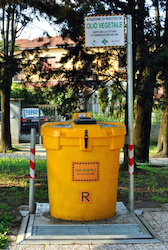Boeing and Commercial Aircraft Corp. of China (COMAC) have opened a demonstration facility that will produce aviation  biofuels from used cooking oil or “gutter oil” as it is called in China. The companies estimate gutter oil could produce 500 million gallons (1.8 billion liters) of aviation biofuels each year.
biofuels from used cooking oil or “gutter oil” as it is called in China. The companies estimate gutter oil could produce 500 million gallons (1.8 billion liters) of aviation biofuels each year.
“Strong and continuing teamwork between Boeing and COMAC is helping our industry make progress on environmental challenges that no single company or country can solve alone,” said Ian Thomas, President, Boeing China. “By working together for mutual benefit, we’re finding innovative ways to support China’s aviation industry and build a sustainable future.”
Boeing and COMAC are sponsoring the China-U.S. Aviation Biofuel Pilot Project. It will use a technology developed by Hangzhou Energy & Engineering Technology Co., Ltd. (HEET) to clean contaminants from waste oils and convert it into jet fuel at a rate of 160 gallons (650 liters) per day. The project’s goal is to assess the technical feasibility and cost of producing higher volumes of biofuel.
“We are very happy to see the progress that has been made in the collaboration between Boeing and COMAC, especially the achievement in aviation biofuel technology,” said Dr. Guangqiu Wang, Vice President of COMAC’s Beijing Aeronautical Science & Technology Research Institute. “We will continue to work with Boeing in energy conservation and emissions reduction areas to promote the sustainable development of the aviation industry.”
The Boeing Current Market Outlook forecasts that China will require more than 6,000 new airplanes by 2033 to meet fast-growing passenger demand for domestic and international air travel. Boeing and COMAC have been collaborating since 2012 through their Boeing-COMAC Aviation Energy Conservation and Emissions Reductions Technology Center. The biojet fuel produced by the project will meet international specifications approved in 2011 for jet fuel made from plant oils and animal fats. This type of biofuel has already been used for more than 1,600 commercial flights.

